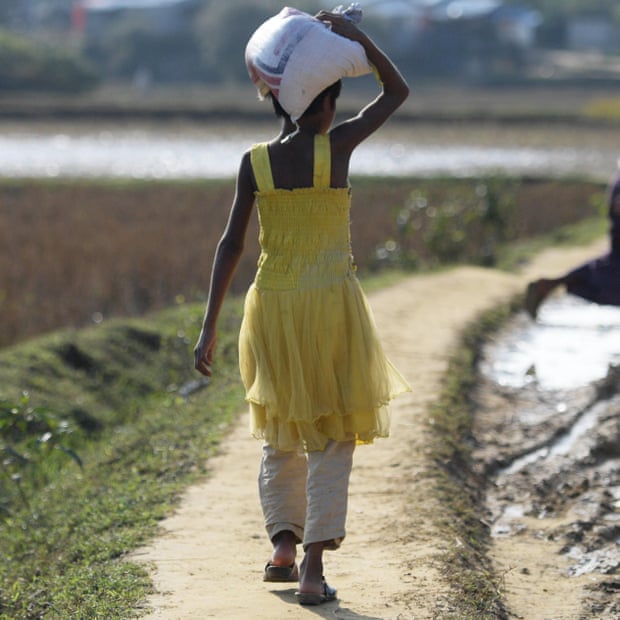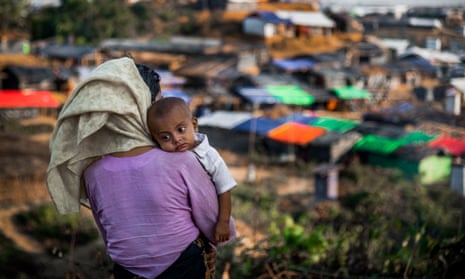Bangladesh is planning to introduce voluntary sterilisation in its overcrowded Rohingya camps, where nearly a million refugees are fighting for space, after efforts to encourage birth control failed.
More than 600,000 Rohingya have arrived in Bangladesh since a military crackdown in neighbouring Myanmar in August triggered an exodus, straining resources in the impoverished country.
The latest arrivals have joined hundreds of thousands of Rohingya refugees who fled in earlier waves from Myanmar’s Rakhine state, where the stateless Muslim minority has endured decades of persecution.
Most live in desperate conditions with limited access to food, sanitation or health facilities and local officials fear a lack of family planning could stretch resources even further.
Pintu Kanti Bhattacharjee, who heads the family planning service in the district of Cox’s Bazar where the camps are based, said there was little awareness of birth control among the Rohingya.
“The whole community has been deliberately left behind,” he said, citing a lack of education in Myanmar, where the Rohingya are viewed as illegal immigrants and denied access to many services.
Q&AWho are the Rohingya and what happened to them in Myanmar?
Show

Described as the world’s most persecuted people, 1.1 million Rohingya people live in Myanmar. They live predominately in Rakhine state, where they have co-existed uneasily alongside Buddhists for decades.
Rohingya people say they are descendants of Muslims, perhaps Persian and Arab traders, who came to Myanmar generations ago. Unlike the Buddhist community, they speak a language similar to the Bengali dialect of Chittagong in Bangladesh.
The Rohingya are reviled by many in Myanmar as illegal immigrants and suffer from systematic discrimination. The Myanmar government treats them as stateless people, denying them citizenship. Stringent restrictions have been placed on Rohingya people’s freedom of movement, access to medical assistance, education and other basic services.
Violence broke out in northern Rakhine state in August 2017, when militants attacked government forces. In response, security forces supported by Buddhist militia launched a “clearance operation” that ultimately killed at least 1,000 people and forced more than 600,000 to flee their homes. The UN’s top human rights official said the military’s response was "clearly disproportionate” to insurgent attacks and warned that Myanmar’s treatment of its Rohingya minority appears to be a "textbook example” of ethnic cleansing.
When Aung San Suu Kyi rose to power there were high hopes that the Nobel peace prize winner would help heal Myanmar's entrenched ethnic divides. But she has been accused of standing by while violence is committed against the Rohingya.
In 2019, judges at the international criminal court authorised a full-scale investigation into the allegations of mass persecution and crimes against humanity. On 10 December 2019, the international court of justice in The Hague opened a case alleging genocide brought by the Gambia.
Bhattacharjee said large families were the norm in the camps, where some parents had up to 19 children and many Rohingya men have more than one wife.
District family planning authorities have launched a drive to provide contraception, but say they have so far managed to distribute just 549 packets of condoms among the refugees, who are reluctant to use them.
They have asked the government to approve a plan to launch vasectomies for Rohingya men and tubectomies for women, Bhattacharjee said.
But they are likely to face an uphill struggle.
Many of the refugees told AFP they believed a large family would help them survive in the camps, where access to food and water remains a daily battle and children are often sent out to fetch and carry supplies.
Others had been told contraception was against the tenets of Islam.
Farhana Sultana, a family planning volunteer who works with Rohingya refugees in the camps, said many of the women she spoke to believed birth control was a sin.
“In Rakhine they did not go to family planning clinics, fearing the Myanmar authorities would give medicine that harms them or their children,” Sultana said.
Volunteers said they struggled to sell the benefits of birth control to Rohingya women, most of whom came to them for advice on pregnancy complications or help with newborns.
Sabura, a mother of seven, said her husband believed the couple could support a large family.
“I spoke to my husband about birth control measures. But he is not convinced. He was given two condoms but he did not use them,” she said.
“My husband said we need more children as we have land and property (in Rakhine). We don’t have to worry to feed them,” she said.
Bangladesh has for years run a successful domestic sterilisation programme, offering 2,300 taka ($28) and a traditional lungi garment to each man who agrees to undergo the procedure.
Every month 250 people undergo sterilisation in the border town of Cox’s Bazar.
